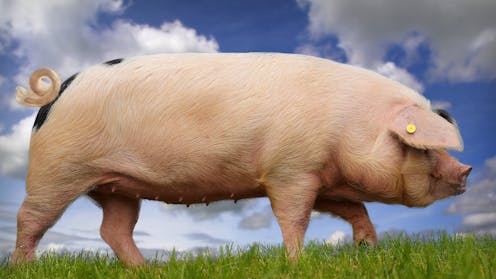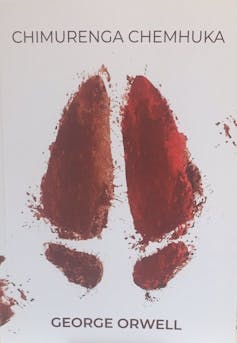
Since independence in 1980, Zimbabwe has in some ways become like Animal Farm. Like the pigs in the classic 1945 novel by English writer George Orwell, the country’s post-liberation leaders have hijacked a revolution that was once rooted in righteous outrage. In Zimbabwe, the revolution was against colonialism and its practices of extraction and exploitation.
The lead characters in Animal Farm have the propensity for evil and the greed for power found in despots throughout history, including former Zimbabwe president Robert Mugabe. Zimbabwe’s leaders have also acted for personal gain. They remain in power with no accountability to the suffering of the people they claim to represent.
Animal Farm’s relevance is echoed in celebrated young Zimbabwean author NoViolet Bulawayo’s recent novel Glory. Her satirical take on Zimbabwe’s 2017 coup and the fall of Mugabe is also narrated through animals. And visual artist Admire Kamudzengerere founded Animal Farm Artist Residency in Chitungwiza as a space for creative experimentation.
It’s within this context that a group of Zimbabwean writers, led by novelist and lawyer Petina Gappah and poet Tinashe Muchuri, have translated Animal Farm into Shona, the country’s most widely spoken language. A dozen writers contributed to the translation of Chimurenga Chemhuka (Animal Revolution) over five years.
It’s clear to me, as a scholar of Zimbabwean literature, that too few great books are available in the country’s indigenous languages. This matters particularly because there are few bookshops and libraries where young people can access good writing. But Zimbabwe’s writers are taking matters into their own hands.
The translation project
Translating Animal Farm into Shona makes perfect sense. Historically, Shona novelists have used animal imagery to conjure up worlds of tradition and custom, and also to examine human foibles. Great Shona writers – such as Solomon Mutswairo, Patrick Chakaipa and more recently Ignatius Mabasa – have written books that use allegory to respond to a range of crises in Zimbabwe. (Allegory is a literary device that uses hidden meaning to speak to political situations – such as using pigs instead of people in Animal Farm.)
Gappah kickstarted the translation project in a private post on Facebook in 2015:
A group of friends and I thought it would be fun to bring the novel to new readers in all the languages spoken in Zimbabwe. This is important to us because Zimbabwe has been isolated so much in recent years, and translation is one way to bring other cultures and peoples closer to your own.

Eight years later, Chimurenga Chemhuka has come to life. It’s a big achievement, considering that publishing has not been performing well in a dire Zimbabwean economy. Gappah and her friends have ambitions to translate and publish Animal Farm in all indigenous languages taught in Zimbabwe’s schools.
Chimurenga Chemhuka
Though Chimurenga Chemhuka is mainly in standard Shona, its characters speak a medley of different Shona dialects – such as chiKaranga, chiZezuru, chiManyika – plus a smattering of contemporary slang. It’s a prismatic translation in one text. As leading UK translation theorist Matthew Reynolds explains:
To translate is to remake, not only in a new language with its different nuances and ways of putting words together, but in a new culture where readers are likely to be attracted by different themes.
The use of dialects activates the book in a comical way that also leaves it open to different interpretations and connections. For example, Zimbabwe’s president Emmerson Mnangagwa, who does not have the same rhetorical gifts as his predecessor, has always tried to distinguish himself with his use of chiKaranga, a dominant dialect of Shona. He adopts a popular wailing Pentecostal style that rises and falls, raising laughter and dust among the rented crowds who attend his rallies.
The title, Chimurenga Chemhuka, is poignant and a direct reference to Zimbabwe’s liberation war. Chemhuka (animal) Chimurenga (revolution) is not a literal translation of Animal Farm, but here the writers take liberties to connect the book to the country’s larger struggles for independence, commonly known as Chimurenga.
Why this matters
This translation project is a significant event in Shona literature.
It’s done by an eclectic group of writers who are passionate about language and literature. They use Orwell’s book and its satiric commentary as a way to creatively express themselves collectively. If this was a choir, the choristers Gappah and Muchuri do a good job of leading a harmonious ensemble.
Read more: NoViolet Bulawayo’s new novel is an instant Zimbabwean classic
This is also the first of a series of Shona translations from House of Books, a new publishing house in Zimbabwe. The book is being promoted via social media platforms, where it is generating conversation about the need for more Zimbabwean translations of classic literature.
Translation was a major activity in Zimbabwe in the 1980s. It was a way for the newly emergent nation to reintegrate into the pan-African intellectual circuit. As Zimbabwe again reels from political and economic oppression, the translation of Animal Farm reveals to the country that what it’s going through is not new. It has happened before, and it will happen again.
Tinashe Mushakavanhu does not work for, consult, own shares in or receive funding from any company or organization that would benefit from this article, and has disclosed no relevant affiliations beyond their academic appointment.
This article was originally published on The Conversation. Read the original article.







